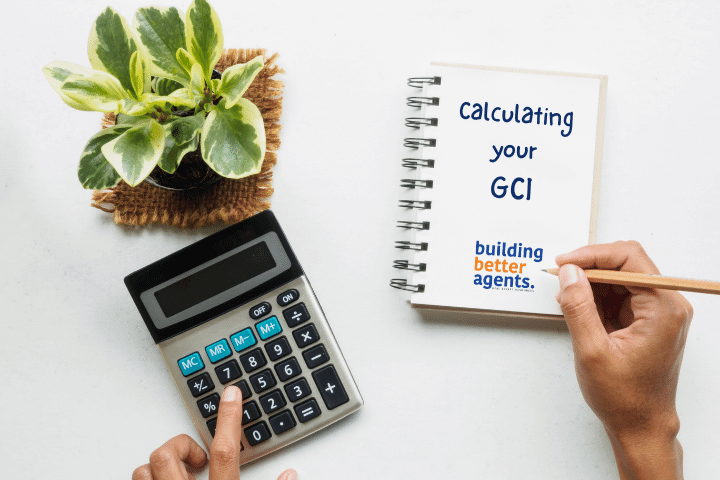

Share this article via:
Please note: This website contains affiliate links. As an Amazon Associate, we earn from qualifying purchases at no additional cost to you.
As you build and grow your real estate business, one key metric you should focus on is GCI or Gross Commission Income. We’re going to take a closer look at GCI in real estate so you know how to calculate it, how to use it to measure your success and how to improve it in the years to come.
GCI stands for Gross Commission Income and it is the total earnings from the real estate commissions on a real estate transaction BEFORE your split with your brokerage.
Now that you know the basic definition, let’s dig a little further to find out why this essential metric is so vital to Realtors. GCI is the entire commission paid as a result of a real estate transaction, as previously stated. In its most basic form, GCI is determined by multiplying the commission rate by the property’s final sale price.


If you aren’t a math wizard, don’t worry! Calculating GCI is a simple formula. You just need to know the commission rate, price of the property, and how many parties the commission is shared between to determine your gross commission income. Here’s a quick example of how it is calculated:
GCI = Sales Price x Commission Percentage
So if you are representing the buyer, the gross commission would be $500,000 x 3%, which equals $15,000 in GCI.
If you are representing the seller, the gross commission would be $500,000 x 2.5%, which equals $12,500 in Gross Commission Income (GCI).
When you help someone purchase a home, your brokerage will split the gross commission with you. So if you have a 70 / 30 split with your broker, your broker would keep $4,500 (30% of $15,000) and you would receive $10,500 (70% of $15,000). Your net commission income (NCI), would be $10,500, assuming that there weren’t any other expenses involved in the transaction.


Net Commission Income (NCI) is the amount of money you actually make after all costs associated with the transaction are deducted. This includes your broker split, staging costs, photography fees, gas, client lunches, etc.
Gross Commission Income (GCI) is the amount you earn before deducting these costs. It is typically higher than NCI because you pay less upfront in commissions when you sell a house.
The most common question I hear when talking to new real estate agents is: Why does my GCI matter? The answer is simple – It matters because it measures the performance of your real estate business. GCI is your revenue stream and shows you exactly how much money you generate from real estate commissions.
At many real estate brokerages, the commission split can vary depending on the number of transactions you do or the volume earned. For example, one brokerage may have a 50/50 commission split for your first three sales, then a 70/30 commission split for your next five sales, and then a 90/10 split after that. As a real estate agent, it can get a little confusing when you’re trying to track your sales each year. If you are able to compare your GCI earnings year over year and it keeps going up, you know that you are on the right path.
When you are in real estate, you own your own business. And as a business owner, you want to carefully track your income, right? This will help you budget in the years to come and know what types of marketing or systems you need to keep investing in..
There are several things you can do as a real estate agent to earn more income. One way is add flat fees to your real estate services. The other is to negotiate for a higher percentage of the commission on all of your listings. Here are some tips to increasing your GCI:
As a real estate agent, you can charge extra fees for certain services such as staging, photography, etc. These additional fees can help you earn more money. Here are some examples of how you can charge your clients for these extras:
While this won’t turn you into a millionaire, it could easily generate several thousand dollars in gross commission income each year.
Surprisingly, many real estate agents find that negotiating for their commission is not their strong suit. Being able to show your value to your seller clients to get a higher commission rate, is key to increasing your gross commission income each year.


Quick example: Let’s say that you sell 10 listings each year with an average commission of 2.5% and an average sales price of $500,000. If you could get your average commission to 3.0% in this scenario, you could earn an additional $25,000 in GCI each year!
The average annual gross commission income (GCI) for a full-time realtor is approximately $100,000 per year. However, there are realtors who make well over $1 million annually. There are also realtors who make less than $20,000 a year. It all depends on the market conditions, competition, and many other factors.
According to NAR, the median gross commission income of REALTORS® was $43,330 in 2020, a decrease from $49,700 in 2019. They also broke it down by the number of years in the business:
Honestly, that’s completely up to you! But setting a goal for your Gross Commission Income each year is important. Many agents like to set a goal of increasing their GCI by 5% or 10% each year, but before setting any goals, it’s important to look at the current real estate market, average sales prices in your area and pull together a marketing plan to help you generate the additional sales income each year.
Volume or Sales Volume is the total amount of real estate transactions completed during a specific period of time (usually annually). To calculate your volume, just add up the sales price of all the homes you sold last year. If you don’t have a list of the exact sales price but know the average price, you could refer to this example:
If you sold 20 homes with an average sales price of $320,000, your total sales volume for the year would be $6,400,000.
Please note: This website contains affiliate links. As an Amazon Associate, we earn from qualifying purchases at no additional cost to you.
Share this article via:




I’ve helped hundreds of agents build successful businesses, generate more leads, and expand their teams into multiple states.
This website uses cookies to ensure you get the best experience on our website. View our Privacy Policy here.